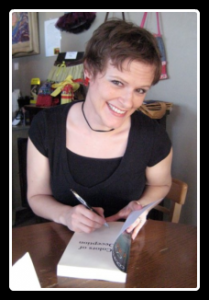 No, we’re not talking shoe brands. We’re talking the basics of good writing, and they’re on my mind this week. I suspect the cause of this fundamental ruminating is my being sick for most of the past week. There’s something about forced wallowing in one’s own misery that resets the brain to KISS* mode.
No, we’re not talking shoe brands. We’re talking the basics of good writing, and they’re on my mind this week. I suspect the cause of this fundamental ruminating is my being sick for most of the past week. There’s something about forced wallowing in one’s own misery that resets the brain to KISS* mode.
So: Stop, drop, and think, my dear inklings. In three brief points, let’s review some of our basic writing principles.
Three Writing Basics
- Every story has a beginning, a middle, and an end.
- In the beginning, you introduce your protagonist and her goal. You also introduce your antagonist and his goal. The antagonist’s goal must be in direct conflict with your protagonist’s goal.
- In the middle, your protagonist works toward her goal while the antagonist works against her. The protagonist suffers setback after setback. The antagonist crows diabolically. Action and tension build and build and build until your reader’s head starts splitting at the seams.
- In the end, tension builds up to the climax, which is the most dramatic point in the story. Here, your protagonist experiences a major turning point for better or for worse. Usually, she ends up getting what she wants after having paid a price she didn’t want to pay. Finally, you tie up any loose ends and send your reader home with a satisfied sigh.
- “The road to hell is paved with adverbs.” –Stephen King
And other terrible things such as poor spelling, run-on sentences, verbose flowery stuff, dangling participles (*shudder*), incorrect punctuation, weak verbs, and dialogue tags other than “said” (Yes, your characters may mutter or snap, but only at direst need.). Don’t do any of these things, and your readers will thank you for it.
My publisher, Consortium Books, uses The Chicago Manual of Style for editing purposes. I highly recommend.
- What your readers want matters.
You’re not writing for you. You might think you’re writing for you, but you’re not. If you are telling stories, then you are a storyteller, and storytellers always have an audience, even if they haven’t found that audience yet. If you are a writer, you are in the entertainment business. You are writing for your readers, and at some point, like it or not, you’re going to have to give them what they want.
What do they want? Well, that depends on what genre you’re writing. My current novel series, Demons of Saltmarch, is Christian fantasy. My readers want something otherworldly and supernatural. Something adventurous and faith-challenging. They want a story that packages the spiritual in the tangible. They don’t want vulgar language, sex scenes (although I’ll admit I push the envelope a little on that one), anti-Christian propaganda, or preaching. In showcasing concepts of faith, I walk a fine line for my reader’ sake.
In contrast, my epic fantasy series has an audience with different expectations. They can probably handle a bit of faith discussion — but what they’re really after is transportation into a world wholly unlike their own. They want adventure and magic. They don’t mind vulgar language and a sex scene or two (actually, most of them probably want those). They want creatures they’ve never seen, places they’ve never been, and cultures they’ve never experienced. They want (read: demand) believable characters in an unbelievable world which is my job to make believable.
Oh, and they want non-cliché elves. Those are very important.
And that’s WILAWriTWe!
What are your writing basics?
Tell us in the comments!
*Keep It Simple, Stupid 😉






I’m commenting only to say that you will not Nah me with your elf-related and low hanging troll bait.
What? I have no idea what you’re talking about. ; )
1. I realized the other day that I have too many people ‘muttering’ rather than using ‘said’ – sometimes I really would prefer to use a descriptive word instead of said, but I know you are right.
2. Oh the fight against the adverb. Every now and then I throw one in and feel like I’m committing a crime.
3. I do agree that we must write for the audience–but I’m the audience too. If I don’t enjoy what I’ve written, I assume my readers won’t either. I am still not sure just what genre I’m writing in, so I’m sometimes not that clear on what my audience would expect. I think I need to work on this one.
Pam, I get ya on the preference for descriptive tags. I’d rather use those, too…but I think the challenge is to craft the dialogue and the visuals so well that the readers can see how the characters are saying something, making the descriptive tags unnecessary.
I do sometimes use adverbs, but I try not to have more than one on any given page.
And you should absolutely enjoy what you’re writing! No question about that. If you have no fun with it, neither will your readers. I wholly believe in writing something I would want to read. But I have to remember to write it so that others will want to read it, too.
Genre research can be tedious, but I find it mostly fun. Part of the enjoyment is in realizing that because I’m writing something I’d like to read, I already have a lot in common with my target audience. It’s neat to discover similarities — as well as nuances that my audience pays attention to but I never had before. : )